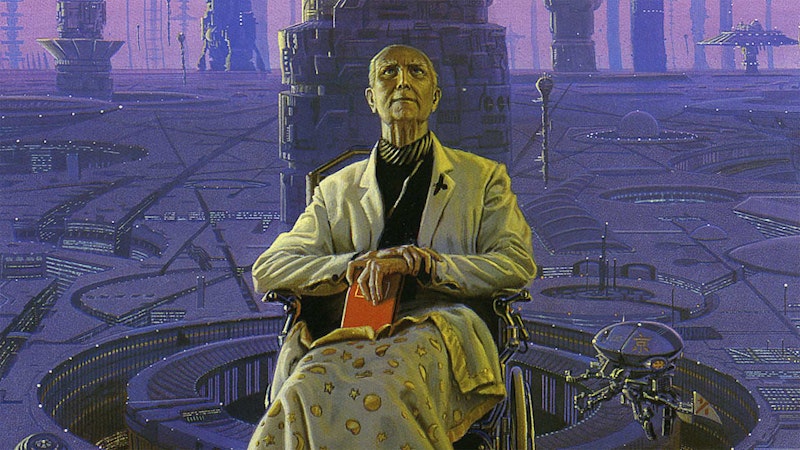The Foundation Trilogy, how did it hold up? Just great, Isaac Asimov found. At 60 or so, the author reread the famous stories he’d written so long ago. He discovered that this work of college-boy Asimov and grad-student Asimov still read just fine. “It was a page-turner,” Asimov writes in I, Asimov, one of his autobiographies. Mature Asimov eagerly followed “how my characters were going to solve their problems,” reading on “with steady excitement.”
Because of the I, Asimov passage, I bought an old paperback of Foundation and reread it. I didn’t get to the second book. “Bridle and Saddle,” from Foundation, used to be my favorite story in the trilogy, a prime example of the series delivering the goods. I decided as much in junior high and didn’t think about it again until my second look. Now “Bridle and Saddle” strikes me as an example of a story that doesn’t work unless the characters steadfastly ignore the obvious. But to explain why I’ll have to tell the story, including its twist.
Foundation, a colony of scientists, is surrounded by medieval-style planets organized as kingdoms. The colony wants to keep its neighbors happy, so it’s granted them high technology (ray guns, atomic power). But the rulers of the various planets don’t control the technology. Priests do, native-born priests who worship Foundation as the home and source of their religion. Eventually the biggest kingdom gets tired of dependency and decides to conquer Foundation. But the priests won’t allow the invasion of Heaven. With the attack about to begin, they pull the plug: no more tech, the invaders are paralyzed, Foundation triumphs.
It's a very large sociological fact that Foundation’s neighbors all depend for technology on a priesthood that regards the Foundation as holy. Foundation’s mayor knows this fact; so do the opposition members agitating for preemptive war. The rulers of the kingdom know too. Everybody knows. But for the story to proceed they have to swear off the next obvious realization, which is that messing with Foundation will upset the priests and thereby threaten the rulers’ access to high tech. The dumbos ruling the kingdom don’t get it, but neither do the smart guys on Foundation. Instead they sit fretting and debating until the obvious happens.
“Bridle and Saddle,” like a lot of Asimov, is a story where people observe drily and retort quizzically. The hero goes even further and wryly aphorizes; consider his favorite specimen, “Violence is the last refuge of the incompetent.” The story makes a lot of being intelligent, and the climax comes when we see logic at work. All the hero had to do was figure out the state of play and apply a nudge. Then the situation, like a mousetrap, snapped shut on the aggressor’s hand. The beauty of that sort of climax depends on inevitability combined with unexpectedness. I think here the second element is a bit cooked. The logic is sound, so sound that the characters had to take an oath of stupidity until the author had his twist ready to go.

